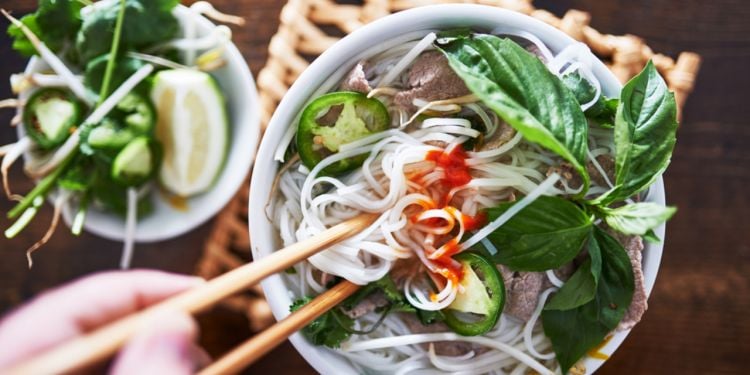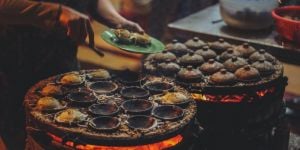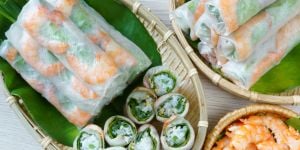
If you are relocating to Vietnam, sampling as much as possible of the delicious cuisine needs to be a top priority. Read on to discover what to expect and how to navigate dietary restrictions abroad.
An overview of the Vietnamese cuisine
Vietnamese cuisine is well-known and beloved outside the country for many good reasons. Vietnamese food is known for being light but satisfying, tasty, and gentle on the stomach. There is generally very little use of dairy and oil, and dishes combine simple ingredients yet have a multitude of flavors, textures, and balance. You'll have meals that consist of starch, protein, and fresh vegetables and quickly understand why the Vietnamese are considered a relatively healthy and fit nation.
You'll find a lot of dishes comprising ginger, lemongrass, mint, coriander, chili, and Thai basil leaves. A typical Vietnamese meal would include rice or noodles, fish/meat/tofu (grilled, boiled, or stir-fried), raw or pickled vegetables, broth or soup, and fresh fruit or pudding as a sweet finish!
Depending on where you are, there will be local dishes specific to the region. The north generally has less spicy dishes and will take inspiration for more soups, stews, and porridge for their colder weather. Weaving a delicate balance of flavors, you'll enjoy prawns, shrimp, crab, and pork regularly.
The mountainous central landscape of Vietnam is where you'll find the country's spiciest and most colorful food. Meals are complex and often include chili peppers and fish sauce. The central region is one of the only regions that gets a little quirky with signature dishes like bun bo hue, including a gelatinous square of cow blood.
In the south, fresh fruits and livestock are abundant, and dishes tend to be sweeter than anywhere else in the country. This is attributed to people in the South adding more sugar to their broths or recipes or enjoying a coconut milk panache. If you have diabetes, make sure to check your blood sugar regularly, as you may ingest more sugar than you're aware.
Drinking and dining in Vietnam
Vietnam has an eccentric drinking culture, and it is common at any time of day to walk past West Lake in Hanoi and find groups of men drinking beer at Bia Hoi establishments playing a game of chess or just having a good laugh and gossiping. The same can be said in the South, where long lunches or team dinners keep BBQ and hot pot restaurants busy every night of the week.
The craft beer scene in Vietnam has exploded in the last decade. You will be able to taste crisp lagers, refreshing red ales, strong double and triple IPAs, and a mixture of experimental locally-made brews. There is a craft brewery in almost every large city in Vietnam, and we highly recommend going to check one out. Most of the time, brewers can be found at their tap houses, and you'll get a good drinking buddy if you mention any curiosity about the local craft origins.
Mainly in the North, Vietnamese love to produce family-recipe rice wines and can use ingredients ranging from snakes to simple herbs. The preferred method is to drink the rice wine by shots, but be warned that the standard proof is higher than 40% and will sneak up on you! If you are with Vietnamese friends and celebrating a wedding or a holiday, be prepared to receive many toasts and cheers until the night gets a little blurry!
Vegetarian and vegan food options in Vietnam
If you are a vegetarian or vegan, you might be wondering whether you will struggle when moving to Vietnam. The good news is that it is possible to find vegan and vegetarian-friendly options around most of the country.
By nature, there are a number of traditional Vietnamese dishes that do not contain animal products. These are typical dishes that would have meat, but tofu is used as a substitute. In addition, because meat is just part of a meal (and not the hero of the dish as in many Western cuisines), you can simply ask for meat to be left out of a dish, and you will still have a filling meal that remains. In all towns and cities, there will be restaurants and supermarkets catering to the Western diet, too, so you will have plenty of options.
When ordering drinks, specify what you can't have instead of assuming you and the restaurant will have the same understanding. While dairy is not often used in traditional Vietnamese recipes, condensed sweetened milk is a staple. Stay vigilant with coffee orders and smoothie recipes to avoid any surprises.
The bigger hurdle for vegans is the sneaky addition of fish sauce in many recipes. You can say “Không nước mắm xin vui lòng” (no fish sauce, please) and receive a small in return as they wonder why you wouldn't want to eat this notorious side dish!
There are many foreigner-friendly vegetarian and vegan restaurants in the main cities of Hanoi and Ho Chi Minh City, including iVegan or Kiez Vegan. Do a quick Google search or use Facebook to your advantage and join groups promoting this specific lifestyle in Vietnam.
We do our best to provide accurate and up to date information. However, if you have noticed any inaccuracies in this article, please let us know in the comments section below.












Comments